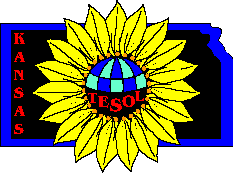
Winter 2005-2006
Preview of KATESOL 2006
Diane Larsen-Freeman
Bruce Veldhuisen
Intensive Programs Rebound
![]()
/ Index /
/ Letters /
/ Profiles /
/ Search /
![]()
Subscribe
for free!

K-State Leading Upswing in International Student Numbers
Programs Start to Bounce Back from 9-11
The intensive English language program at Kansas State University is undergoing a period of rapid growth in numbers of international scholars arriving on campus for undergraduate, graduate, and post-graduate academic programs. Mary Wood, ELP director, and Jim Lewis, international student recruiter, have teamed to bring about a true sense of renewal at K-State, which had had to pare down its intensive English program in the aftermath of 9-11. "We kept our core faculty employed with part-time assignments in other departments on campus," explained Mary Wood, "so we were better positioned to react when international student numbers went up again." In December, two new full-time hires were added to her ESL teaching staff, and a new influx of students in January has made it necessary to advertise two additional full-time teaching positions.
Student visas are becoming a higher priority, thanks to lobbying from groups like the NAFSA Association of International Educators (nafsa.org). “I really believe we will get past this moment in our history,” said Betty Soppelsa, deputy executive director at NAFSA, in a recent speech at Kansas University, “and we will refocus our energy and ideals towards openness to and interest in the global community.”
Michele Kelemen, in a February 20, 2006, National Public Radio broadcast, reported that the U.S. State Department and Homeland Security are making it easier for foreign scholars to get visas.
But the past four years have taken their toll at campuses across America. Drops in international student enrollments forced many institutions to close their English programs, including prestigious intensive English centers at the University of Berkeley and the University of Minnesota, and forcing career ESL instructors to retrain for other occupations. In Kansas, Fort Hays State University had to close it’s intensive English program two years ago. The Applied English Center at the University of Kansas, which for decades has maintained a stable enrollment of 300-400 students, had to cut teaching and administrative staff to the “bare bones” because of the lack of new international student arrivals last year.
“I got a call recently from a vice-president at one university, asking me how to go about starting an intensive English program again,” said Wood, who predicts that it will take a year or more for such schools to gear up to handle the increased enrollments that are coming—and, indeed at K-State, are here today.
At the 24th annual conference of Kansas TESOL (Teachers of English to Speakers of Other Languages), February 3-4, 2006, on the K-State campus, Mary Wood is collaborating with two other K-State administrators on an institute, "Bridging Campus and Community," to present practical ideas for networking with local organizations to meet the diverse needs of international students and their families. There are half a dozen more sessions at this year’s KATESOL meeting dealing specifically with college-level and adult English language learners, reflecting the increasing importance of innovative programs to recruit international students, as college campuses begin competing again for increasing numbers of these vital additions to any institution of higher education.
KATESOL Press Release
2006 ESL MiniConference Online
Robb@ESLminiconf.net